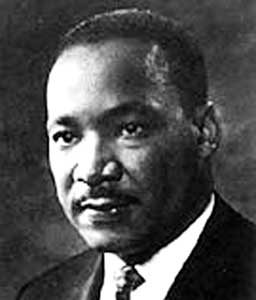
Martin Luther King (1929 - 1968)
Martin Luther King was an American clergymen, Nobel Peace Prize winner and one of the principal leaders of the American civil rights movements. King was born on January 15, 1929 in Atlanta, Georgia. His father was a Baptist minister, his mother a schoolteacher. Originally named Michael, he was later renamed Martin. He entered Morehouse College in 1944 and then went to Crozer Religious Seminary to undertake postgraduate study, receiving his doctorate in 1955. Returning to the South to become pastor of a Baptist Church in Montgomery, Alabama, King first achieved national renown when he helped mobilise the black boycott of the Montgomery bus system in 1955. This was organised after Rosa Parks, a black woman, refused to give up her seat on the bus to a white man – in the segregated south, black people could only sit at the back of the bus. The 382-day boycott led the bus company to change its regulations, and the supreme court declared such segregation unconstitutional. In 1957, King was active in the organisation of the Southern Leadership Christian Conference (SCLC), formed to co-ordinate protests against discrimination. He advocated non-violent direct action based on the methods of Gandhi, who led protests against British rule in India culminating in India's independence in 1947. In 1963, King led mass protests against discriminatory practices in Birmingham, Alabama where the white population were violently resisting desegregation. The city was dubbed 'Bombingham' as attacks against civil rights protesters increased, and King was arrested and jailed for his part in the protests. After his release, King participated in the enormous civil rights march in Washington in August 1963, and delivered his famous “I have a dream” speech, predicting a day when the promise of freedom and equality for all would become a reality in America. As the civil rights movement became increasingly radicalised, King found that his message of peaceful protest was not shared by many in the younger generation. King began to protest against the Vietnam war and poverty levels in the US. He was assassinated on April 4, 1968 during a visit to Memphis, Tennessee. |
|
||||||
|| Front
Page | News
| Editorial
| Columns
| Sports
| Plus
| Financial
Times | International
| Mirror
| TV
Times | Funday
Times || |
| |
Reproduction of articles permitted when used without any alterations to contents and the source. |
© Copyright
2008 | Wijeya
Newspapers Ltd.Colombo. Sri Lanka. All Rights Reserved. |
